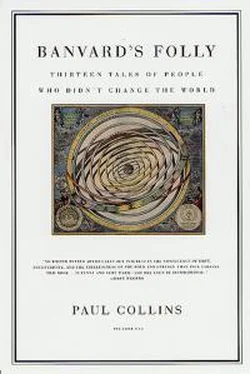Tupper, unlike many poets, hadn't conveniently gone away. Rather than getting borne off in his glamorous youth by a bout of consumption, he had aged and stayed very much alive. He could always be counted on for a poem when any sort of national or local commemoration called for it, and was happy to dedicate a poem or two to a good cause or a benefit show. He was particularly keen on promoting kindness to animals, "for I believe in some future life for the lower animals as well as for their unworthier lord." Furthermore, Tupper's visage was everywhere--even on soapboxes and tobacco ads, though Tupper detested advertising.
His very generosity and omnipresence worked against him. By the 1870's, each week began to bring fresh pummelings by clever young men in humor magazines like Punch, Figaro, and The Comic. One particularly nasty attack was penned by H. C. Pennell:
"Off! Off! thou art an ass, thou art an
ass, Thou man of endless words and little sense, Of pigmy powers and conceit immense-Thou art a Donkey!--Take a bit of
grass?"
Oh Martin! Oh, my Tupper! thus
exclaims A grov'ling Age, grown envious of thy
fames,-Thou boundless sonnets; and Proverbial bays
....
Yet will I breathe my pleasant Poems forth Innumerable. Hundreds more--ay tens Of thousands! Sweet ethereal rhymes, I hold ye here! and hug ye--all the lot;-A monstrous pile of quintessential
ROT!!
It is little wonder that Walter Hamilton, writing on Tupper in the 1889
volume Parodies of the Works of English and American Authors, was taken aback by how many writers went "to hunt most mercilessly to death his Proverbial Philosophy." Critics wishing to smear a new author would simply call him "a Tupper." Tennyson, who had also lived to an old age, was chagrined to find himself lumped together with Tupper by hostile critics. In fact, so many poets were tarred this way that a new insult, "Tupperian," entered the language. It can still be found in the eternal rest of dead verbiage, deep between the covers of the Oxford English Dictionary.
Even less aggressive attacks--like a parody of Proverbial Philosophy's opening lines, altered to "BEER, hath entered my head ar And peopled its inner chamber"--had the cumulative effect of a snowdrift slowly covering up the body of Tupper's work. But Tupper pressed still onward, forced by dire finances
--for he lost most of his money in bad investments, an insurance swindle, and in bailing out his dissolute son Martin Jr.--and released two expanded editions of Proverbial Philosophy in the late 1860's. His old friend Gladstone, now Prime Minister, quietly diverted some government funds to his ailing classmate; and, showing that his sympathetic comments on Tupper's fame were no mere pose, Oliver Wendell Holmes also pledged a few guineas to him.
Sales of the new editions were modest but respectable. But even Tupper could now see that his publishing career was slipping into the past. A return tour of America in 1871 was met with enthusiasm in Philadelphia and Manhattan
--Tupper noted with satisfaction that in New York auctions his autograph fetched $3.50, while Dickens's went for just fifty cents--but toward the end of his tour, he was facing half-empty houses. And when his old classmate Thackeray, also on tour, was asked by an American what they thought of Tupper back home, he replied crushingly:
"They do not think of Tupper."
Tupper spent his old age in his usual tireless way. He dabbled in such inventions as improved horseshoes and glass screw tops for bottles, and contrived a curious proportional voting system; the proportions were of morality, with extra votes being doled out to voters who had met certain criteria of worthiness:
SURPLUS CLAIMS--ONE VOTE EACH For the Victoria Cross For the Albert Medal For faithful domestic service in one family [for] twenty-five years For field work on the same farm [for] thirty years As a famous self-taught naturalist And so forth. In-person voting bothered Tupper to no end. "It is a barbarism and an anachronism," he admonished, and imagined that thanks to the modern postal system, soon all voting would be done by mail.
His last few years were as a convalescent, attended to by his many children.
The occasional letter still came from America asking for an autograph, and his devoted daughters always read to him from the paper each day. But they did not tell him of the family's declining finances, or that his writing no longer brought in any money at all. When he died in 1889, even the London Times was inclined to temper its criticism in its obituary: "That he enjoyed a strange and unique position in literature is beyond question. This is a tribute to the
British heart rather than to its intellect."
Amazingly, Tupper's works have been out of print for over a century now. He had approached twenty-six publishers in 1875, hoping to publish a Collected Works; everyone turned him down. An illustrated 1881 edition of Proverbial Philosophy sold so poorly that his publishers, the Cassell brothers, took to taking swipes at each other in the columns of the Times. Since then, there has only been silence on the topic of Tupper.
It's an ironic fate for a man whose headstone reads, He being dead yet speaketh. Quite to the contrary: Tupper speaketh not. Even as we still read Tennyson and Browning, Tupper has vanished from anthologies and literary histories. Scholars in English literature pass through both an undergraduate and graduate education without ever hearing of the man. This may be because anthologies create a vast gulf between the value of those who are remembered and those who are not, and the effect feeds upon itself: can this writer be important, a reader may assume, if I have not heard of him before?
When the Times Literary Supplement published a brief retrospective on the man in 1938--one of the few articles written about him in the entire twentieth century--its writer could only conjecture, "Whenever a poet arises who can say what all of the people are saying, and say it all the time, we may see an explanation of the once world-wide popularity of the Proverbial Philosophy; and an explanation of its complete disappearance." And indeed Tupper's poetry did express the morality of his day. When his day passed, so did much of his writing.
It didn't help that Tupper was also capable of writing poems like "The Toothache":
A raging throbbing tooth,--it burns, it
burns! Darting its fiery fibres to the brain, A stalk of fever on a root of pain, A red hot coal, a dull sore cork
by turns, A poison, kindred to a viper's fang, Galling and fretting: ha! it stings again!
And yet not all of Tupper's poetry is so ludicrous, nor all his moralizing so moth-eaten. Tupper still has his charms for the patient reader. But scholars and readers are not always patient people; when they do not see an immediate use for an old writer, they do not file him away or look more closely at their own idea of "usefulness." They simply forget him.
It is a mark of Tupper's utter obscurity today that buying an original Tupper manuscript is cheaper than paying the photocopy fee for his work from a library. There is, in my household, a small space kept for one such autographed manuscript page. It would please Tupper no end to know that even now, he might still reach a growing child or two to impart his proverbial wisdom.
A DEDICATED AMATEUR OF FASHION
It is hard to achieve greatness, but harder still to have the passions of greatness without the talents to realize them.
For those lacking great skill, the London stage during the reign of George III was a cruel and unforgiving place, as William Henry Ireland was once unfortunate enough to discover. Yet just a few years after that teen prodigy's spectacular flameout, there appeared on the boards of Drury Lane another
doomed soul--a man both so seemingly bereft of talent and so monumentally confident of his abilities that he created an entire thespian tradition all to himself. This one lone soul had, in his middle age, the courage not only to move to a foreign land and reinvent himself as an actor, but to pursue this acting career through a driving hail of ridicule and spite--sustained only by his utter and unrequited love for the theater.
Читать дальше











